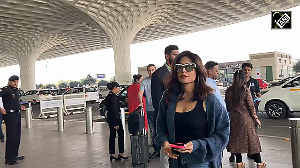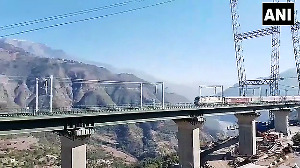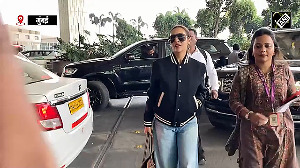Delhi Chief Minister Sheila Dikshit tells Sreelatha Menon that the Centre can continue to handle the city's law and order situation but should reform the police system.
You have always wanted law and order and the police machinery to be under the state government. Was that what you asked for when you met the new home minister?
No. I do not want law and order to be with Delhi. What I have been saying is that I would like to see a more responsive police system. What I have suggested is to divide law and order, traffic and security into three separate departments. If you have someone doing traffic and he remains in that, he will become a specialist in that. Let these be specialised branches.
What has the home ministry said on this since you are not asking for control over the police?
They said it is not a bad idea and would look into it.
Since combating terrorism has become a big responsibility for the states, do you think having special police guards could help?
We have not asked for that. But the police have to be strong. For they alone have the legal authority to take action in their areas when something happens. So it is important to train them and make them specialists in combating threats to law and order.
There are Supreme Court orders asking for enforcement of the recommendations of the Soli Sorabji committee on police reforms in every state. The Centre is yet to enforce them in Delhi. Have you pressed on this to the home ministry?
I don't know about this.
Is the state looking at providing an unemployment insurance to cushion those who lose jobs in companies registered here?
I think companies are mostly in the neighbouring states. So we are not thinking of anything like that.
What is the status of the project for providing identity cards for citizens which was to be piloted in Delhi?
I don't know the methodology being followed. But one suggestion is to see that people coming to Delhi have identity cards indicating the place they are coming from.
Do you think your stand on the BRT (bus rapid transit) system has been vindicated? What steps are you taking to improve it?
Definitely. It is a big victory for the BRT system. All our candidates in the area where the system was introduced won with a thumping majority. It proves that those who opposed it weren't road-users but some vested interests. Of course we are taking steps to correct wherever it was wrong. We have to be careful now. In east Delhi, for instance, traffic and road systems are different and so we will design the system there accordingly. In Ambedkar Nagar, it was not that the road was not wide. The use was chaotic. Mostly buffalos were being taken from there and there was massive parking on the road. BRT brought in changes that constricted some space. The special purpose vehicle is at work to redesign it. Five corridors have been planned and the work will start this year.
How are you carrying forward your plan to cleanse the Yamuna?
EIL has presented its report on how it will do it. We are taking it to the Cabinet soon and then it will go to the government of India. The scheme involves municipality, the Delhi government, the Delhi Jal Board, the Flood Control Department as well as the environment ministry.
What is the new plan and what is the deadline and the cost?
We will place interceptors at the mouth of the drains through which water flows into the river from sewers and other sources. There are three big drains. Water would be treated at the interception and let into the river. The project would be completed in three years. And it would cost Rs 2,000 crore.
Will you resolve the dichotomy between the government and the municipality in your third term as you keep complaining that schools, cleanliness and other issues with the municipality don't submit to the policies of the government?
At present, the MCD (Municipal Corporation of Delhi) is beholden to none. I believe we are not taking powers from the MCD when we talk of reforms. We want it more efficient. For instance, cleaning the city is its job in most places. You see how terribly it does it. The schools it runs are in a bad shape. We have to change the rules in the National Capital Territory Act to achieve some changes.
There is a trend of private companies going slow on public-private partnerships due to recession. You are modeling many of your projects under the PPP mode. Are you facing trouble?
We may face trouble if private investors turn back. We are giving them land and asking them to run projects -- for instance, hospitals. Three super-speciality hospitals are to come up on a PPP basis. We have issued PPP tenders for transport also. We are sitting with our fingers crossed, especially as we are short of teachers and doctors and these new projects must happen fast.
There are complaints of ration cards going into the wrong hands and the deserving not getting them. Some say they have been asked for their voter I-cards if they want to get their ration cards made. And I-cards are being delayed despite applications being accepted?
These may be people who are from outside Delhi. One has to go into this.
How late are you in finishing the preparations for the Commonwealth Games. What is your fund shortage?
I would say that our progress is not unsatisfactory. We have a lot to do but multiplicity of authority slows it. Coordination is a problem and it is with the sports ministry now. The GoM is looking into this.
And what's your dream?
It is the same. To make Delhi a world-class city, also a heritage city.






 © 2025 Rediff.com -
© 2025 Rediff.com -